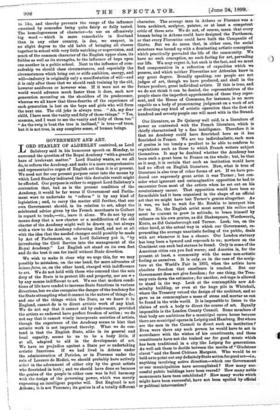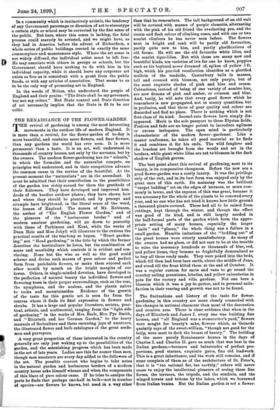GOVERNMENT AND ART.
LORD STANLEY OF ALDERLEY contrived, as Lord Salisbury said in his humorous speech on Monday, to surround the question of the Royal Academy "with a graceful haze of irrelevant matter." Lord Stanley wants, as we all do, to reform the Academy, and make it a more comprehensive and representative organ of English art than it is at present. We need not for our present purpose enter into the means by which Lord Stanley indicated that this desirable result might be effected. Our purpose is rather to support Lord Salisbury's contention that, bad as is the present condition of the Academy, it would be far worse if Government and Parlia- ment were to undertake to " reform " it by any kind of legislation ; and, to carry the matter still further, that our own Government should, in its relation to art, adopt the celebrated advice given by the French merchants to Colbert
in regard to trade,—viz., leave it alone. We do not by any means deny that a new charter or a modification of the old charter of the Academy might well be drawn up, but always with a view to the Academy reforming itself, and not at all with the idea that the needed changes could possibly be made by Act of Parliament, or, as Lord Salisbury put it, " by introducing the Civil Service into the management of the Royal Academy." Let English art stand on its own feet and do the best it can for itself without State direction.
We wish to make it clear why we urge this, for we may possibly be mistaken, on the one hand, for mere advocates of laissez-faire, or, on the other hand, charged with indifference to art. We do not hold with those who contend that the sole duty of the State is to protect life and property, nor are w e by any means indifferent to art. We see that modern condi- tions of life have tended to increase State functions in various directions, but we also recognise the danger of the tendency for the State attempting what it cannot in the nature of things do; and one of the things which the State, as we know it in England, cannot do is to direct artistic work of any kind. We do not say that it cannot aid by endowment, provided the artists so endowed have perfect freedom of action ; we do not say that it cannot wisely incorporate societies of artists, though the experience of the Academy seems to hint that artistic work is not improved thereby. What we do con- tend is that the English State, alike in its general and local capacity, seems to us to be a body little, if at all, adapted to aid in the development of art. We have no prejudice against a State per se undertaking artistic functions. If we had lived in Athens under the administration of Pericles, or in Florence under the rule of Lorenzo de Medici, we should probably have actively aided in the adornment of either city by the great artists who flourished in both ; and we should have done so because the genius of the people in either case was in full harmony with the design of the governing power, which was merely expressing an intelligent popular will. But England is not Athens; it is not Florence; its genius is of a totally different character. The average man in Athens or Florence was a born architect, sculptor, painter, or at least a competent critic of these arts. We do not, of course, mean that every human being in Athens could have designed the Parthenon, or that every Florentine could have built the Campanile of Giotto. But we do mean that, in either case, the social structure was bound up with a dominating artistic conception which practically pervaded the life of the community. We have no such conception, no such feeling for art, pervading our life. We may regret it, but such is the fact, and we must find compensation in a reflection of capacities which we possess, and which neither Florentine nor Athenian knew in any great degree. Broadly speaking, our people are not judges of art, though we have produced, and shall in the future produce, great individual artists. If this is true, and we do not think it can be denied, the representatives of the people share the imperfect apprehension of those they repre- sent, and the House of Commons, for instance, is no more capable as a body of pronouncing judgment on a work of art or directing any kind of artistic operation than the first six hundred and seventy people one will meet with in the Strand.
Onr literature, as De Quincey well said, is a literature of power as contrasted with the French literature, which is chiefly characterised by a fine intelligence. Therefore it is that no Academy could have flourished here as it has flourished in France. We are too individualistic, each man of genius is too lonely a product to be able to conform to regulations such as those to which French writers subject themselves. It may be doubted whether the Academy has
been such a great boon to France on the whole ; but, be that as it may, it is certain that such an institution would have had no effect on English literature. Now, what is true of literature is also true of other forms of art. If we have pro- duced one supremely great artist it was Turner ; but con- sider what ignorant and unimaginative opposition he had to encounter from most of the artists when he set out on his revolutionary career. That opposition would have been so formidable had it been organised in the shape of an official art that we might have lost Turner's genius altogether. As it was, we had to wait for Mr. Ruskin to interpret him for us. No, the English artist must accept his milieu and must be content to grow in solitude, to brace himself by reliance on his own genius, as did Shakespeare, Wordsworth, Keats, as did Gainnborough and Turner. Look, too, on the other hand, at the actual way in which our Government, re- presenting the average unartistic feeling of the public, deals with art whenever it has a chance. Our London statuary has long been a byword and reproach to us ; nowhere on the Continent can such bad statues be found. Only in some of the American cities can you find worse; and America is, for the present at least, a community with the same non-artistic feeling as ourselves. It is only, as in the case of the sculp- ture at the World's Fair in 1893, when the artists have absolute freedom that excellence is reached. But our Government does not give freedom; for one thing, the Trea- sury cuts down the estimates ; for another, red-tape is allowed to stand in the way. Look at the contemptible new Ad-
miralty building, or even at the huge pile in Whitehall, where the Treasury vetoed the design of the architect, and so gave us as commonplace a mass of stone and mortar as can be found in the wide world. It is impossible to listen to the claims of such a body to direct the course of art. Equally impossible is the London County Council. Some members of that body are ambitious for a municipal opera house because there are municipal operas in Leipzig and Hamburg. But where are the men in the Council to direct such an institution P Even were there any such person he would have to act in accordance with the wishes of his constituents, and these constituents have not the trained ear for good music which has been traditional in a city like Leipzig for generations. As well ask them to decide between the merits of "Gladstone claret" and the finest Château Margaux. Who would be so bold as to point out any definitely State action for good art—i.e., anything involving active direction—which our Government or our municipalities have accomplished ? How many suc- cessful public buildings have been reared? How many noble monuments have been established ? How many works which might have been successful, have not been spoiled by official or political intervention ? In a community which is instinctively artistic, the tendency of any Government patronage or direction of art to stereotype a certain style or school may be corrected by the fine sense of the public. But here, where this sense is lacking, the fatal process could scarcely be arrested, and we might have, as they had in America before the advent of Richardson, a whole series of public buildings erected in exactly the same commonplace and monotonous style. Where the art sense is not widely diffused, the individual artist most be left free. He may associate with others in groups or schools, but the Government should have nothing to do with him in his individual capacity, while it should leave any corporate art union as free as is consistent with a grant from the public funds, or with any articles of association. That seems to us to be the only way of promoting art in England.
In the words of Milton, who understood the people of England and their genius : "The State shall be my governors, but not my critics." But State control and State direction of art necessarily implies that the State is fit to be our critic.



















































 Previous page
Previous page